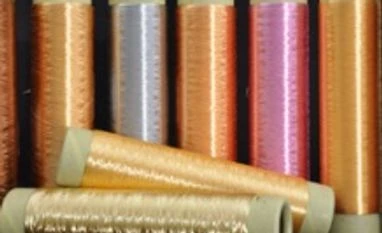The continued fall in crude oil prices over recent months has led to domestic synthetic yarn makers incurring stock and margin losses.
The fall in prices of petrochemicals, including key polyester yarn raw material such as monoethylene glycol (MEG) and purified terephthalic acid (PTA), has forced yarn makers to reduce prices. Data from Platts, the energy monitoring agency, show MEG and PTA prices were $988 a tonne and $1,008.2 a tonne as on August 22. These were down by 23 per cent and 37 per cent, respectively, as on December 19, at $765 and $635.2. As a result, the price of the texturised roto-80 benchmark synthetic yarn is being quoted at Rs 100-110 a kg, as against Rs 130 a kg only two to three months earlier, down 25-30 per cent.
“Yarn makers had held stocks at $115 a barrel levels and are now incurring loss on stock and margins,” said Jyotiprasad Chiripal, director at the Ahmedabad-based Chiripal Group, which has a daily capacity of 175 tonnes of synthetic yarn and a daily sales turnover from this of Rs 2-2.5 crore.
Adding to the problem for synthetic yarn makers is the sluggish demand from mills, said Jayesh Pathak, president of the Bombay Yarn Merchants Association.
“Yarn prices have fallen by 25 per cent in two months. And, textile mills are in a wait-and-watch mode, hoping for a further fall in crude oil prices,” he said.
Chiripal believes the loss of stock and margins would be short-lived. “The industry hopes to soon wrap up the old stock of raw materials and begin utilising fresh inventory at the current level of reduced rates. This will result in synthetic yarn makers making the most of the fall in crude oil prices and raw material prices. However, it is yet to be seen how textile mills will respond,” he said.
The fall in prices of petrochemicals, including key polyester yarn raw material such as monoethylene glycol (MEG) and purified terephthalic acid (PTA), has forced yarn makers to reduce prices. Data from Platts, the energy monitoring agency, show MEG and PTA prices were $988 a tonne and $1,008.2 a tonne as on August 22. These were down by 23 per cent and 37 per cent, respectively, as on December 19, at $765 and $635.2. As a result, the price of the texturised roto-80 benchmark synthetic yarn is being quoted at Rs 100-110 a kg, as against Rs 130 a kg only two to three months earlier, down 25-30 per cent.
“Yarn makers had held stocks at $115 a barrel levels and are now incurring loss on stock and margins,” said Jyotiprasad Chiripal, director at the Ahmedabad-based Chiripal Group, which has a daily capacity of 175 tonnes of synthetic yarn and a daily sales turnover from this of Rs 2-2.5 crore.
Adding to the problem for synthetic yarn makers is the sluggish demand from mills, said Jayesh Pathak, president of the Bombay Yarn Merchants Association.
“Yarn prices have fallen by 25 per cent in two months. And, textile mills are in a wait-and-watch mode, hoping for a further fall in crude oil prices,” he said.
Chiripal believes the loss of stock and margins would be short-lived. “The industry hopes to soon wrap up the old stock of raw materials and begin utilising fresh inventory at the current level of reduced rates. This will result in synthetic yarn makers making the most of the fall in crude oil prices and raw material prices. However, it is yet to be seen how textile mills will respond,” he said.
)